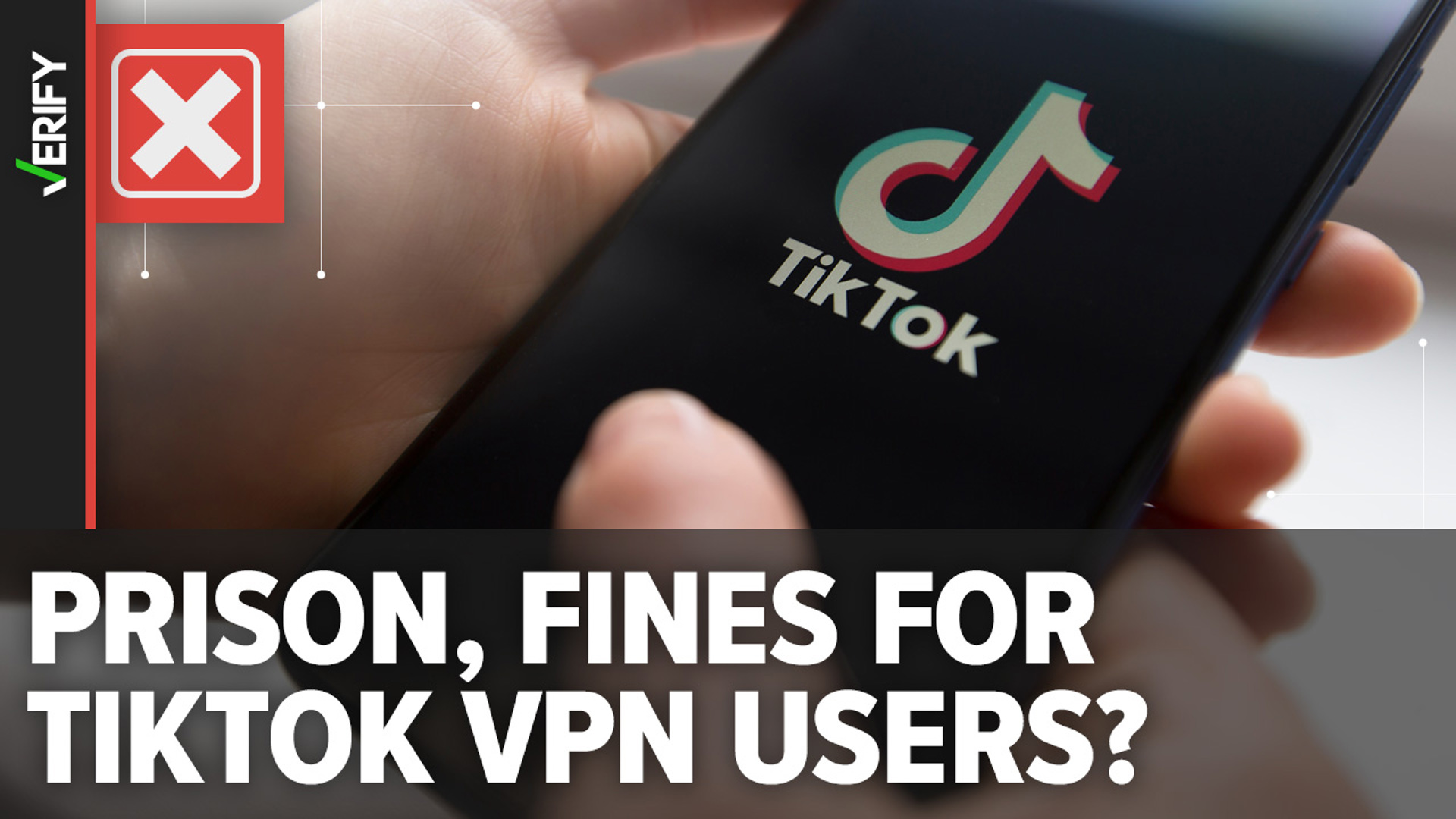President Joe Biden signed legislation into law in late April that would force TikTok to be sold or be banned in the United States within the next nine months.
In May, viral posts on X claimed TikTok users will face criminal penalties if they use a virtual private network (VPN) to access the popular social media app if it’s banned.
“Using VPNs to bypass banned apps, such as TikTok, is made a criminal act under this bill, and the penalty is a minimum imprisonment of 20 years and a minimum fine of $250,000,” a video shared in one of the viral posts claims.
A VPN is an encrypted connection over the Internet from a device to a network, according to Cisco. Many people use VPNs to hide their private information from hackers and to access online content that’s not available in their area, such as to bypass nationwide bans.
THE QUESTION
Could people who use VPNs to access TikTok be punished with prison time and/or large fines if the app is banned under a recent law?
THE SOURCES
- H.R.815 - National Security Supplemental Package
- Press release issued by the Select Committee on the Chinese Communist Party (CCP)
- RESTRICT Act
- Electronic Frontier Foundation (EFF), a nonprofit focused on defending civil liberties in the digital world
- Willmary Escoto, U.S. policy analyst for the nonprofit Access Now
THE ANSWER
No, people who use VPNs to access TikTok will not be punished with prison time and/or large fines if the app is banned under a recent law.
WHAT WE FOUND
TikTok users will not be punished with prison time and/or large fines for using a VPN to access the popular social media app if it’s banned in the U.S.
The viral social posts are recirculating outdated claims made in a TikTok video from March 2023. That video talks about a different bill that proposed banning TikTok, called the RESTRICT Act. The RESTRICT Act was never signed into law.
The TikTok user in the RESTRICT Act video claimed the bill would impose criminal penalties on people who use a VPN to access TikTok. It’s the same video from the viral post circulating on X that was posted on May 7, 2024.
The “Restricting the Emergence of Security Threats that Risk Information and Communications Technology Act,’’ or the ‘‘RESTRICT Act,” was introduced in the Senate on March 7, 2023. It would have given the Secretary of Commerce broad authority to “identify, deter, disrupt, prevent, prohibit, investigate, or otherwise mitigate” any “transaction” by information, technology, or communications companies that are owned or could be influenced by foreign adversaries.
We VERIFIED in April 2023, around the same time the TikTok video first went viral, that the RESTRICT Act did not explicitly ban VPNs or impose criminal penalties on people who use them, nor did the bill’s text include the words “virtual private network” or “VPN.”
However, some experts we spoke to about the RESTRICT Act said the bill’s broad language left room for doubt about the people and types of technology it would impact.
“While the RESTRICT Act does not explicitly outlaw the use of VPNs, it is drafted broadly enough to raise concerns that using a VPN to access TikTok or other services restricted in the US under the Act could result in severe consequences,” Willmary Escoto, a U.S. policy analyst for the nonprofit Access Now, told VERIFY in an email back in April 2023.
But the RESTRICT Act never made it out of committee, and it is not the same as the TikTok ban legislation that became law on April 24, 2024.
The TikTok ban law, which is known as the “Protecting Americans’ Data from Foreign Adversaries Act of 2024,” gives TikTok’s Chinese-owned parent company, ByteDance, nine months to sell the popular social media platform or be banned nationwide.
The law does not criminalize TikTok users, and a specific provision in the law’s text says that individual TikTok users cannot be prosecuted under the law. The legislation also does not include the words “virtual private network” or “VPN.”
Congress’ Select Committee on the Chinese Communist Party (CCP), which sponsored the first iteration of the law, also said in a March press release that the legislation would not punish individual social media users.
“This bill only applies to specifically defined social media apps subject to the control of foreign adversaries, as defined by Congress,” the press release says. “No enforcement action can be taken against individual users of an impacted app.”
The law specifically targets social media applications and websites that are controlled by foreign adversaries of the U.S. that “pose an unacceptable risk to U.S. national security.” Those foreign adversaries, which are defined in Title 10 of the U.S. Code, include Russia, Iran and North Korea, in addition to China.
On May 7, TikTok and ByteDance filed a lawsuit against the federal government to block the law that would ban the app in the U.S., saying it unfairly singles out the platform and is an unprecedented attack on free speech.
The Associated Press contributed to this report.

